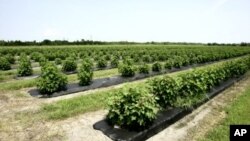Energy companies around the world have been buying up land in Africa to grow crops that can be converted into fuel. While these biofuels have been touted as a cleaner alternative to fossil fuels, more environmental groups want the investment curbed - warning that biofuels are causing more harm than good.
Promises
When an Italian-owned energy company proposed to buy land in the woodlands of eastern Kenya to grow jatropha trees to make biofuel, they promised jobs, development and money to the communities living there.
But the rights group ActionAid says when the deal was being signed, the people most affected had not been told the truth. ActionAid team leader in Kenya's Coast region David Barissa Ringa says plans to co-opt some 20,000 hectares of land for a jatropha plantation would have displaced some 20,000 people.
“They were really enraged about what happened, because if anything, you can imagine having to leave your farm, having to leave your homestead and destroy everything and move and nobody has promised you any new land where you can actually relocate and continue your daily life,” said Ringa.
The case is now being reviewed by Kenya's Environmental Management Authority, while the company has already agreed to scale back the project to a 2,000 hectare pilot program. Legally, it appears neither the company nor the local authorities who signed the deal had done anything wrong. It was all in line with Kenya's existing constitution.
Benefits questioned
Rights groups are concerned that, legal or not, the push for biofuels has had a negative impact on local communities in Africa. Ringa, of ActionAid, also questions the environmental benefits.
“The whole essence why people go into biofuel production and greener fuel sources is that we cut down on carbon emissions," he said. "But if you cut down trees, if you have to bring down a whole forest and displace thousands of people from their homestead, I think it doesn't really make any sense.”
In a report earlier this year, a consortium of environmental groups called Friends of the Earth, said European energy companies had bought more than five million hectares of land across Africa, an area larger than the size of Denmark, for biofuel investment.
The report said European Union targets to use 10% biofuel for transportation by 2020 has spurred land grabs.
ActionAid Senior Policy Analyst Marie Brill says her group is pushing for changes to these policies at the United Nations Climate Conference in Durban, South Africa.
“And we'll come to Durban also with a real call that governments come together and commit to drop incentives and mandates and targets for biofuels which has really spurred this push for land and land-use change and threatened food security - not only has threatened food security but also has been dangerous for our environment,” explained Brill.
Tool kits
While environmental groups have made the case against biofuels for years, the United Nations Food and Agricultural Organization (FAO) says the industry can still bring benefits.
“Our conclusion - the basic message is that biofuels are not good or bad per se, it all depends on how you grow them, how you manage them,” said Olivier Du Bois, FAO senior natural resources officer.
The FAO has created tool kits to advise governments and investors setting out on biofuels projects, to help ensure they are environmentally and socially responsible.
DuBois says an important consideration is that the crops grown to create fuel do not compete with those meant to grow food.
"We did some work on cassava for example in Tanzania at the request of the government and we found out that if you increase the yield of cassava enough and if you grow it on land that can be used for other export crops then it doesn't compete with food," said DuBois. "On the contrary, it may actually promote the development of a yield increase which also benefits food production.”
While the merits of the industry may be up for debate, the demand for biofuels has shown no signs of slowing down.
The Bloomberg news agency reports prices for ethanol - a fuel that can be made from sugarcane and corn - have risen to record highs on high demand from Brazil and Europe.
Meanwhile, airlines from the United States to Australia have begun experimenting with biofuel-powered planes. And producers are making plans to ramp up production to meet the growing need.
Africa Biofuel Investment Under Scrutiny
- By Gabe Joselow




